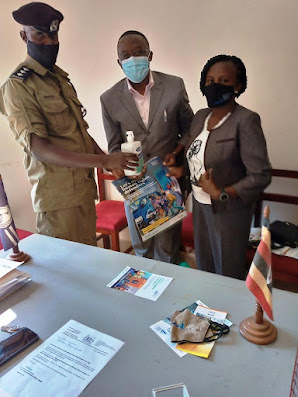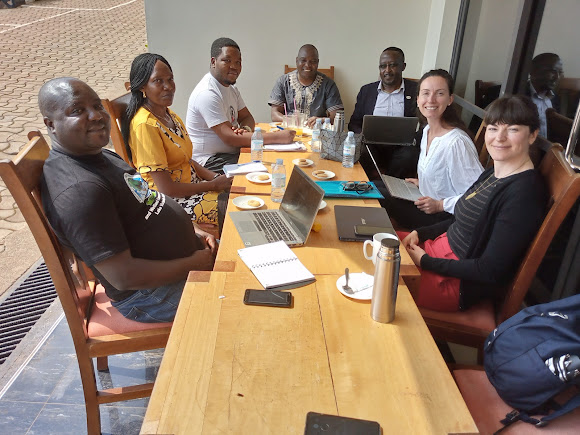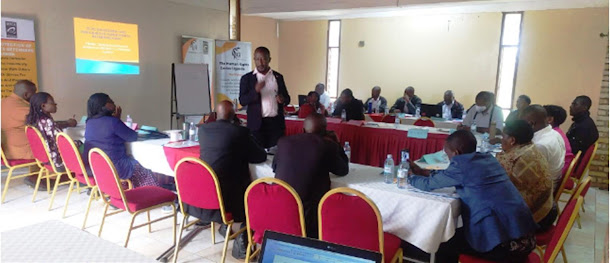CIVIC ENGAGEMENT THE MOST
APPROPRIATE MEANS OF ATTAINING CHANGE
Civic
engagement or civic participation is any individual or group activity
addressing issues of public concern. Civic engagement includes communities
working together or individuals working alone in both political and
non-political actions to protect public values or make a change in a community.
"Contributing
to society and supporting our own well-being are two sides of the same coin --
by being engaged and contributing we bolster our well-being and become more
resilient”.
Civic
engagement involves “working to make a difference in the civic life of one’s
community and developing the combination of knowledge, skills, values and
motivation to make that difference. It means promoting the quality of life in a
community, through both political and non-political processes.”
Civic
engagement includes both paid and unpaid forms of political activism,
environmentalism, and community and national service. Volunteering, national
service, and Human Rights Education are all forms of civic engagement.
Participation
in civic engagement activities can help citizens become better informed about
current events.
HRBA
creates channels for the participation of a broad spectrum of stakeholders,
including, poor and disadvantaged people, minorities, indigenous peoples,
women, children and youth. HRBA promotes active, meaningful and continuous
voluntary participation; it stresses that developing capacities for
participation is an important result in itself.
Definition
and Constructs
Civic
engagement is defined as working to make a difference in the civic life of
one’s community. It also involves developing the combination of knowledge,
skills, values, and motivation to make that difference. These activities enrich
the lives of citizens and are socially beneficial to the community. We take a
look at the four constructs
FOUR CONSTRUCTS OF CIVIC
ENGAGEMENT
|
FOUR CONSTRUCTS OF CIVIC ENGAGEMENT
|
|
Civic
Engagement
Working to make a difference
in the civic life of one’s community
|
Civic
Action
Civic
Commitment or Duty
Civic
Skills
Social
Cohesion
|
|
Civic Action;
or participation in activities such as volunteering or service learning to
help better the community
Civic Commitment;
or Duty, or the willingness to make positive contributions to society
Civic skills;
or the ability to be involved in civil society, politics and Democracy
Social Cohesion
; or a sense of reciprocity, trust and bonding to others.
|
It’s
found out that “among HRDs, volunteering plays a valuable role in shaping how they
learn to interact with their community and develop the skills, values, and
sense of empowerment necessary to become active citizens.”
Another
possible form of civic action and civic commitment and duty is Human Rights
Education. Research shows that HRE and civic engagement can be related but are
not the same thing. HRE does not have to include a civic dimension and not all
forms of civic engagement are HR based.
"As
people face more and more Human Rights challenges, in terms of environmental,
economic and social factors like Poverty, GBV and climate change, as well as
mental health issues, the potential for simple programmes like community empowerment,
inclusivity to improve resilience is really exciting through participatory
approach.”
Our
communities are stronger when everyone has the opportunity to contribute. Just
and resilient states rely on empowered communities—we believe that participatory
design is key to that process. Our work as HRDs can help a community establish
relationships through coordination, gain knowledge, and be better prepared to
face dynamic Human Rights challenges.
We believe that engaging
communities in design thinking is an important way to create successful
interventions from planning and design through implementation. The community’s
input shaped a neighborhood identity that they could proudly integrate into
development projects with greater autonomy and cohesion. This is attained
through Participatory Approach.
International Covenant on
Economic, Social and Cultural Rights (ICESCR)
Highlights Violations of
Economic, Social and Cultural Rights
The
notion of violation applied vigorously to civil and political rights is often
not used regarding economic, social and cultural rights. The Committee on
Economic, Social and Cultural Rights has developed the concept of 'minimum core
obligations'. The Committee developed this concept mainly to refute the
argument that lack of resources hinders fulfillment of obligations. The Committee
has stated that every State has a minimum core obligation to satisfy minimum
essential levels of each of the rights of the Covenant. The Committee has
clarified that a State party 'in which any significant number of individuals is
deprived of essential foodstuffs, of essential primary health care, of basic
shelter and housing, or of the most basic forms of education is prima facie,
failing to discharge its obligations under the Covenant'.
Thus,
it can be construed that failure to fulfill minimum core obligations will be a
violation of the rights enshrined in the Covenant. However, the notion of
violation of economic, social and cultural rights need to be further developed.
A group of distinguished experts in international law has developed principles
known as the Limburg Principles. These principles provide a basic framework
through which the notion of violations of economic, social and cultural rights
can be developed. According to the Limburg Principles, ‘a failure by a State
party to comply with an obligation contained in the Covenant is, under
international law, a violation of the Covenant.’
Provisions
Articles 2(2) and 3:
Non-discrimination
Article
2 (2) and Article 3 deal with the non-discrimination aspect. Article 2 (2) is
similar to other instruments in stating that the rights should be enjoyed
without discrimination on the grounds of 'race, colour, sex, language,
religion, political or other opinion, national or social origin, property,
birth or other status.'
The
Committee’s General Comment No.20 underlines that, in order for States parties
to “guarantee” that the Covenant rights will be exercised without
discrimination of any kind, discrimination must be eliminated both formally
(ensure that the State’s Constitution and laws do not discriminate) and
substantively (elimination of de facto discrimination in practice). States
parties must make particular efforts in eliminating systemic discrimination and
discrimination in the private sphere (families, workplaces).
Article
3, on the other hand, is more specific. It provides for the 'equal right of men
and women to the enjoyment of rights…set forth in the Covenant.'
The
concept of 'progressive realization' is not applicable to the
non-discrimination clause and the obligation to ensure equal rights of men and
women. The obligation is to ensure it immediately and not progressively.
The obligation to ensure the
equal rights of men and women includes affirmative action to eliminate
conditions that contribute to discrimination.
Gender Equality as a Human Right
This
refers to the equal rights, responsibilities, and opportunities of Women, and
men, girls and boys and of gender-diverse people. They all enjoy the same
status and have equal opportunity to realise their full human rights and
potential to contribute to national, political, economic, social and cultural
development and to benefit from the results.
This is protected by;
-
The Charter of
the United Nations
-
Constitutive
Act of the African Union
-
Universal
Declaration of Human Rights (UDHR)
-
International
Covenant on Civil and Political Rights (ICCPR)
-
International
Covenant on Economic, Social and Cultural Rights (ICESCR)
-
The Convention
on Elimination of All forms of Discrimination against Women (CEDAW)
-
The Protocol
to the African Charter on Human and People’s Rights on the Rights of Women in
Africa (Maputo Protocol)

 In
our Discussions, we realised that partnership and collaboration with State
Agencies and Actors in different aspects of Human Rights will play a major role
in ensuring that Human Rights in Kigezi Sub Region are Promoted, Protected, and
Fulfilled. This would be realised through consistent engagements, trainings and
other avenues where messages are shared on the role of Duty bearers and Rights
Holders in a sense of promoting development.
In
our Discussions, we realised that partnership and collaboration with State
Agencies and Actors in different aspects of Human Rights will play a major role
in ensuring that Human Rights in Kigezi Sub Region are Promoted, Protected, and
Fulfilled. This would be realised through consistent engagements, trainings and
other avenues where messages are shared on the role of Duty bearers and Rights
Holders in a sense of promoting development.















.jpg)

.jpg)


.jpg)